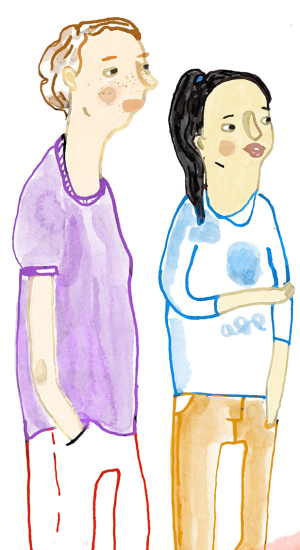The project has first and foremost played an important role in raising awareness of sexual violence,
and provided both students and school personnel with tools for preventing and responding to situations of risk. It has also initiated a discussion on the social aspects of sex, which had previously been missing in the sexual education curriculum and was strongly appreciated by students who have taken part in Fair Sex workshops. In the context of the Åland Islands, ‘Fair Sex’ has by now become an established term for consensual sex rather than a name of a specific method or project.
However, the work in this field should be seen as a start, and not an end. According to the recent school health promotion study from 2013 , the percentage of girls who had once or on repeated occasions suffered sexual violence on Åland remains as high as in 2011. A group of students from an upper secondary vocational school on Åland, who had been interviewed for a local newspaper in connection to the publication of the above mentioned results, indicated that Fair Sex workshops are useful, but this type of discussion should start already in a lower secondary school where the prevailing macho culture leads to negative consequences for both girls and boys. Feeling pressured into sex by external expectations is just one of the many examples of how young people are affected by gender stereotypes. According to the opinion of the interviewed students, teachers together with other school personnel ought to be more active in reducing ‘everyday sexism’. The engagement of students in addressing the problem of sexual violence is a positive sign of a greater awareness among young people and a proof that the Fair Sex Method has generated a broader discussion on these issues. However, the schools hold a responsibility to keep the discussion on gender roles and gender equality alive and maintain the work of the established gender equality groups; otherwise there is a risk that the impact of similar project initiatives might be short-lived.
 In order for the work that has been initiated and developed within the framework of the project “Fair Sex” to live on, there is a need to continue knowledge building activities on gender and norm-critical perspectives for the whole school personnel so that it is integrated into education and other school activities and not just limited to the work of gender equality groups or Fair Sex workshops. The topics discussed in the Fair Sex workshops should also be included into other school subjects covering the issues related to respect, communication and setting boundaries. The eventual resistance in making a long-term commitment to promoting gender equality and preventing sexual violence in a school environment can most effectively be overcome by providing an enhanced understanding of how gender inequality, gender roles and sexual violence are interlinked. The school representatives need to be continuously updated on research findings and statistics so that their work is based on facts rather than feelings and assumptions. Otherwise there is a risk that such work reinforces gender stereotypes and norms instead of challenging them.
In order for the work that has been initiated and developed within the framework of the project “Fair Sex” to live on, there is a need to continue knowledge building activities on gender and norm-critical perspectives for the whole school personnel so that it is integrated into education and other school activities and not just limited to the work of gender equality groups or Fair Sex workshops. The topics discussed in the Fair Sex workshops should also be included into other school subjects covering the issues related to respect, communication and setting boundaries. The eventual resistance in making a long-term commitment to promoting gender equality and preventing sexual violence in a school environment can most effectively be overcome by providing an enhanced understanding of how gender inequality, gender roles and sexual violence are interlinked. The school representatives need to be continuously updated on research findings and statistics so that their work is based on facts rather than feelings and assumptions. Otherwise there is a risk that such work reinforces gender stereotypes and norms instead of challenging them.
Structured discussions on sex and sexuality with students are needed to balance out the flow of simplified and stereotypical images from TV, magazines, films, advertising and pornography that young people are exposed to. For a sustainable impact, Fair Sex workshops should be included into an educational curriculum on related topics. In this way, discussions and thought processes promoted by the workshop could be further developed and the dialogue on respect, communication, gender equality and mutuality in sexual relationships would be kept alive.




